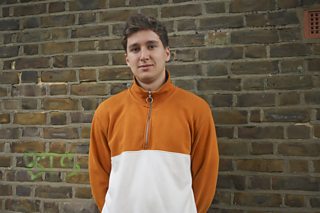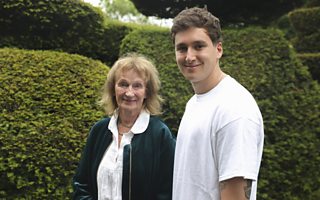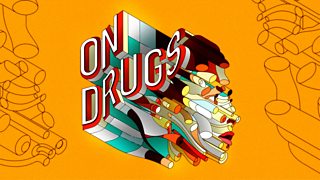Jacob Hawley: 5 Things I've Learned About The UK Drug Scene
My name is Jacob Hawley, and I make a living from drugs. In that I’m a full-time professional comedian who makes a living doing comedy around the topic of drugs, and I've got a 大象传媒 Sounds podcast, Jacob Hawley: On Drugs, that explores the UK drugs scene.

The last few months of my life have largely been dedicated to this project - to investigating drug culture in the UK and the effects it has; from politics to policing to our health service to nightclubs. As a recreational user of drugs for the best part of a decade, I’ve been staggered by how much I've learned in a matter of weeks.
I’ve been delighted to meet so many people along the way, and to share my journey with listeners of the podcast in a way that hopefully entertains, informs, and enlightens.
And probably means I won’t ever be able to get a normal day job ever again.
1. Legalisation has its complications
I used to be a believer that legalising cannabis was a sensible policy. As a fairly liberal, left-leaning person it felt like the right thing, and my conversation with Professor David Nutt confirmed this in my mind.
However, I also spoke to Kevin Sabet, an American campaigner who has advised three US Governments on drugs policy, and his points made me reconsider: ”Saying that we should legalise Cannabis because alcohol and tobacco are legal is like saying ‘because my headlights are broken I should bash in my tail lights too!’”
What all my contributors agreed on was that, regardless of which substances are legal and which aren’t, better education is needed on drug culture. If only there was a comedian making an informative and entertaining drug themed podcast for the 大象传媒…
2. Acid trips could be used as a form of therapy, but there’s a long way to go

Amanda Fielding, known as the “Acid Countess” and founder of The Beckley Foundation - a think tank dedicated to psychedelic research - has done fascinating research into the potential use of psychedelics in treating depression and anxiety.
She told us about Steve Jobs’ revelation that during the 1970s he used LSD as a way of honing his creativity, and added “If we combine the use of these compounds with the best psychotherapy, we can help a person free themselves.”
The research shows there may be a whole host of ways psychedelic substances could be used in future, but there’s still a lot of work to be done before this approach could be officially recommended. Harry Shapiro from DrugsWise reminded us that this research is in its early stages and “does not give the green light to people self-medicating on LSD because of the dangers attached to it.”
3. The chemsex scene is growing quickly
The chemsex scene is growing rapidly, incorporating substances where the difference between life and death can be a shockingly small change in dosage. Yet the language around chemsex can often make it feel unrelated to drug use, as author James Wharton told us.
“If I sat on the number 7 bus and rang up my friend and said ‘Do you want to come up to my apartment and do some drugs?’, everyone will turn around and look at me. And quite rightly so, drugs are bad, right? …It’s all to do with the connotation. If you’re a chem user, you don’t want to be thinking ‘drugs, drugs, drugs’ – it’ll get you down. ‘chems, chems, chems’ is easier.”
Not everyone is using drugs popular in the chemsex scene, such as GHB – which can have a similar effect to Rohypnol, for this purpose though. It’s become popular at raves, and – according to my close friend Jack - even for staying in: “I just watched the Madonna live DVD of her Confessions tour…which is an experience to watch sober.”
4. It isn’t just drug users struggling with addiction...

In episode 2 of the podcast I spoke to Adam Deacon, BAFTA winner and star of Kidulthood and Adulthood, about his cannabis addiction and how it lead to his sectioning under the Mental Health Act in 2015.
Adam spoke about how, growing up, he didn’t even consider cannabis as a real drug, and how an NHS hospital saved him from psychosis.
But during this project I’ve learned about other forms of addiction, some more unexpected. Shaun Attwood, author and former drug dealer, spoke of his addiction to the lifestyle he enjoyed as an Ecstasy dealer: “All of a sudden I’m mister cool guy now! I’m the man with the pills!”
And Elizabeth Burton-Phillips, founder of charity DrugFam and mother of Nicholas who died in 2004, spoke of the way her behavior started to mirror the addictive nature of her son’s before his death.
“It became a family illness, because you become addicted to their addiction in the sense that you are trying to rescue them all the time. You don’t realise that you are caught up in that vortex of secrecy and lies”.
The broadness of addiction was shocking. Dealers can be addicted to dealing, and even some parents of addicts can get addicted to being the parents of addicts.
5. Nightclubs now have medical facilities to help with people on drugs
I’ve been fortunate enough to have been looked after by a medical facility in a nightclub in Germany. I made a mistake, took twice as much of a substance than I meant to, passed out unconscious and woke up with a trained nurse pulling my tongue out of my throat as I lay on a bed with a machine checking my vitals.
And while scary at the time, my friends now enjoy retelling the anecdote, specifically the point where the nurse speculated that I may have soiled myself.
But this isn’t just happening in Germany; clubs in the UK are doing the same now. While not encouraging drug use, clubs are acknowledging that people will enter clubs in a state of inebriation, and often will need care.
Luke Laws of legendary club Fabric in London told us “Let’s be honest, if people can get drugs in to prisons, they’re going to get it in to a club.”
There’s still a lot of room for improvement though, as proven by the circumstances leading to the death of my school friend Max Carlton Smith at a rave, aged 21.
You can hear from his family about what happened to him, and how we can all better look out for each other, in episode 4.

